
Bubble tea is a tea-based drink that originated in Taiwan in the early 1980s. Taiwanese immigrants brought it to the United States in the 1990s, initially in California through regions including Los Angeles County, but the drink has also spread to other countries where there is a large East Asian diaspora population.

The Democratic Progressive Party (DPP), abbreviated in Taiwanese Mandarin as Mínjìndǎng, is a Taiwanese nationalist and centre to centre-left political party in Taiwan. It is the major ruling party in Taiwan as of January 2024, controlling both the presidency and the unicameral Legislative Yuan, also the dominant party in the Pan-Green Coalition.
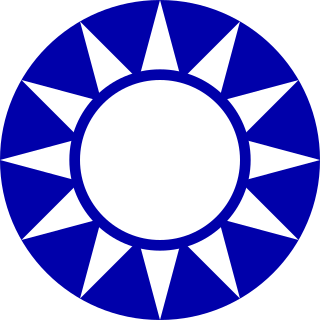
The Kuomintang (KMT), also referred to as the Guomindang (GMD), the Nationalist Party of China (NPC) or the Chinese Nationalist Party (CNP), is a major political party in the Republic of China, initially based on the Chinese mainland and then in Taiwan since 1949. It was the sole ruling party in China during the Republican Era from 1928 to 1949, when most of the Chinese mainland was under its control.

Kaohsiung, officially Kaohsiung City, is a special municipality located in southern Taiwan. It ranges from the coastal urban center to the rural Yushan Range with an area of 2,952 km2 (1,140 sq mi). Kaohsiung City has a population of approximately 2.73 million people as of October 2023 and is Taiwan's third most populous city and largest city in southern Taiwan.

Taiwan, officially the Republic of China (ROC), is a country in East Asia. It is located at the junction of the East and South China Seas in the northwestern Pacific Ocean, with the People's Republic of China (PRC) to the northwest, Japan to the northeast, and the Philippines to the south. The territories controlled by the ROC consist of 168 islands with a combined area of 36,193 square kilometres. The main island of Taiwan, also known as Formosa, has an area of 35,808 square kilometres, with mountain ranges dominating the eastern two-thirds and plains in the western third, where its highly urbanized population is concentrated. The capital, Taipei, forms along with New Taipei City and Keelung the largest metropolitan area. With around 23.9 million inhabitants, Taiwan is among the most densely populated countries.
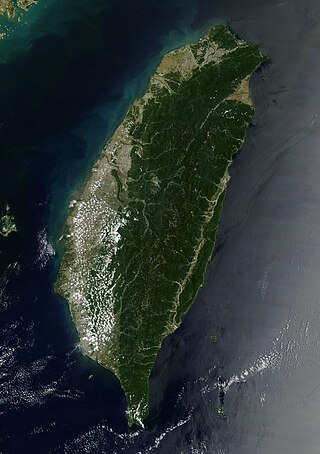
Taiwan, officially the Republic of China (ROC), is an island country in East Asia. The island of Taiwan, formerly known as Formosa, makes up 99% of the land area of the territories under ROC control. The main island is 35,808 square kilometres (13,826 sq mi) and lies some 180 kilometres (112 mi) across the Taiwan Strait from the southeastern coast of the People's Republic of China (PRC). The East China Sea lies to the north of the island, the Philippine Sea to its east, the Luzon Strait directly to its south and the South China Sea to its southwest. The ROC also controls a number of smaller islands, including the Penghu archipelago in the Taiwan Strait, the Kinmen and Matsu Islands in Fuchien near the PRC's coast, and some of the South China Sea Islands.
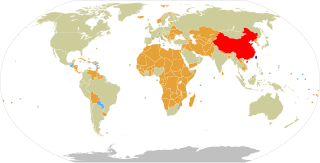
Taiwan, formally known as the Republic of China (ROC), currently has formal diplomatic relations with 11 of the 193 United Nations member states and with the Holy See, which governs the Vatican City State, as of 25 January 2024. In addition to these relations, the ROC also maintains unofficial relations with 59 UN member states, one self-declared state (Somaliland), three territories, and the European Union via its representative offices and consulates under the One-China Principle. In 2021, the Government of the Republic of China had the 33rd largest diplomatic network in the world with 110 offices.
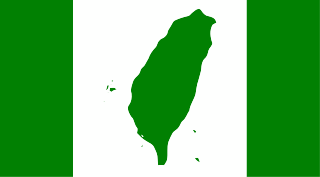
The Taiwan independence movement is a political movement which advocates the formal declaration of an independent and sovereign Taiwanese state, as opposed to Chinese unification or the status quo in Cross-Strait relations.

Taiwanese indigenous peoples, also known as Formosans, Native Taiwanese, Austronesian Taiwanese or Gaoshan people, and formerly as Taiwanese aborigines, are the indigenous peoples of Taiwan, with the nationally recognized subgroups numbering about 569,000 or 2.38% of the island's population. This total is increased to more than 800,000 if the indigenous peoples of the plains in Taiwan are included, pending future official recognition. When including those of mixed ancestry, such a number is possibly more than a million. Academic research suggests that their ancestors have been living on Taiwan for approximately 6,500 years. A wide body of evidence suggests that the Taiwanese indigenous peoples had maintained regular trade networks with numerous regional cultures of Southeast Asia before the Han Chinese colonists began settling on the island from the 17th century, at the behest of the Dutch colonial administration and later by successive governments towards the 20th century.
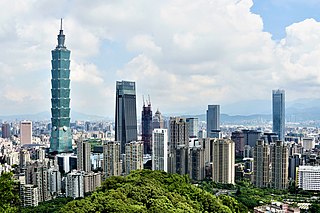
Taipei, officially Taipei City, is the capital and a special municipality of Taiwan. Located in Northern Taiwan, Taipei City is an enclave of the municipality of New Taipei City that sits about 25 km (16 mi) southwest of the northern port city of Keelung. Most of the city rests on the Taipei Basin, an ancient lakebed. The basin is bounded by the relatively narrow valleys of the Keelung and Xindian rivers, which join to form the Tamsui River along the city's western border.

Taiwanese Hokkien, or simply Taiwanese, also known as Taiuanoe , Taigi, Taigu, Taiwanese Minnan, Hoklo and Holo, is a variety of the Hokkien language spoken natively by more than 70 percent of the population of Taiwan. It is spoken by a significant portion of those Taiwanese people who are descended from Hoklo immigrants of southern Fujian. It is one of the national languages of Taiwan.

The president of the Republic of China, commonly known as the president of Taiwan, is the head of state of the Republic of China (Taiwan) as well as the commander-in-chief of the Republic of China Armed Forces. The position once had authority of ruling over Mainland China, but its remaining jurisdictions has been limited to Taiwan, Penghu, Kinmen, Matsu, and other smaller islands since the conclusion of the Chinese Civil War.
The political status of Taiwan or the Taiwan issue is a long-running dispute on the political status of Taiwan, currently controlled by the Republic of China (ROC). This dispute arose in the mid-twentieth century, and is ongoing.
The term One China may refer, in alphabetical order, to one of the following:
"Chinese Taipei" is the term used in various international organizations and tournaments for groups or delegations representing the Republic of China (ROC), a country commonly known as Taiwan.
The New Taiwan dollar is the official currency of Taiwan. The New Taiwan dollar has been the currency of Taiwan since 1949, when it replaced the old Taiwan dollar, at a rate of 40,000 old dollars per one new dollar. The basic unit of the New Taiwan dollar is called a yuan (圓) and is subdivided into ten chiao (角), and into 100 fen (分) or cents, although in practice both chiao and fen are never actually used.

The Chinese people, or simply Chinese, are people or ethnic groups identified with China, usually through ethnicity, nationality, citizenship, or other affiliation.

Tsai Ing-wen is a Taiwanese politician who has been serving as president of the Republic of China (Taiwan) since 2016. A member of the Democratic Progressive Party (DPP), Tsai is the first female president of Taiwan and the second to be born in Taiwan after the end of the Chinese Civil War in 1949. She served as chair of the DPP from 2020 to 2022, from 2014 to 2018, and from 2008 to 2012.

The island of Taiwan, together with the Penghu Islands, became a dependency of Japan in 1895, when the Qing dynasty ceded Fujian-Taiwan Province in the Treaty of Shimonoseki after the Japanese victory in the First Sino-Japanese War. The short-lived Republic of Formosa resistance movement was suppressed by Japanese troops and quickly defeated in the Capitulation of Tainan, ending organized resistance to Japanese occupation and inaugurating five decades of Japanese rule over Taiwan. The entity, historically known in English as Formosa, had an administrative capital located in Taihoku (Taipei) led by the Governor-General of Taiwan.
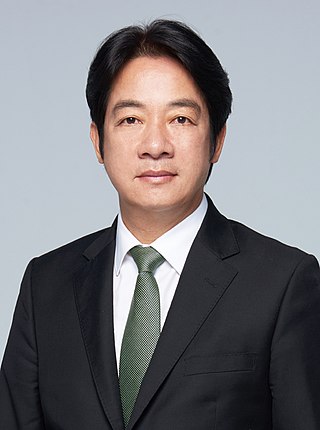
Lai Ching-te, also known as William Lai, is a Taiwanese politician and former physician who is the current vice president and president-elect of Taiwan, having won the 2024 presidential election. His inauguration will be held on 20 May 2024. He is due to be the third incumbent vice president of Taiwan to become president, and the first to assume the office through election instead of a predecessor's death.
















